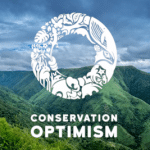Wondering what went right this week in the conservation world? We’ve got you covered with our Conservation Optimism Round-Up! Each week we are collating stories of optimism from around the globe so that you never miss your dose of Monday Motivation.
1. From Reviled to Adored: The story of the Greater Adjutant Stork
“How one community—and one woman in particular—have found a way to protect the rarest stork in the world simply by learning to appreciate the species and embracing it as one of their own.”
The incredible story of Purnima Devi Barman, who has brought the greater adjutant stork back from the brink of extinction and empowered a community of women in the process. #ConservationOptimismhttps://t.co/PvLihStDGC
— Danielle Shaw (@DanielleShaw92) September 17, 2021
2. Scientists describe new tree frog in push to catalog Indonesia’s amphibians
“A recent study by researchers from Indonesia and Japan describes the molecular, morphological and acoustic traits of a new frog species from Java: Chirixalus pantaiselatan.”
New species alert! Scientists have identified a new species of tree frog in push to catalog Indonesia’s amphibians. https://t.co/w0ysbgpPbC #conservationoptimism
— InternetOfElephants (@ioelephants) September 16, 2021
3. Belize applauded for Ambitious Commitment to Protect Coastal Wetlands
“By committing to the protection, conservation, restoration, and expansion of these ecosystems, we aim to demonstrate the important role that nature-based solutions can play in reducing climate risk impacts and absorbing carbon, in addition to a multiplicity of other social and economic benefits. In the long term, Belize will continue to show real leadership in valuing the contribution of these systems that so many of our people depend on for their protection and livelihood.”
#Belize has committed to protect and restore a minimum of 12,000 ha of #mangroves over the next decade!#coastal #wetlands #climatechange #resilience #ocean #marine #blueplanet #nature #biodiversity #conservationoptimism #conservation #LetNatureThrivehttps://t.co/vbAUAmJDvp
— Global Conservation Solutions (@_GCS_) September 16, 2021
4. ‘Momentous’ Moratorium on Deep Sea Mining Adopted at Global Biodiversity Summit
“A vote overwhelmingly in favour of placing a moratorium on deep sea mineral mining at a global biodiversity summit this week has put urgent pressure on the International Seabed Authority to strictly regulate the practice.”
The majority of governments, NGOs & civil society groups voted in favour of a moratorium on deep-sea mining.
— Synchronicity Earth (@SynchEarth) September 15, 2021
Hopefully this will put pressure on the International Seabed Authority to strictly regulate it going forward.https://t.co/R8rJgJs308 #IUCNcongress #ConservationOptimism
5. Scientists Complete the First Map of the World’s Coral Reefs
“Nearly 100,000 square miles of the organism have been charted in high detail to create a tool for conservationists to help save them”
Nearly 100,000 square miles of #coralreef have been charted in high detail to help better understand and protect this increasingly threatened ecosystem. #ConservationOptimism #OceanOptimism #Conservation https://t.co/DIlPdluDUr
— National Environmental Treasure (@Our_Safety_NET) September 14, 2021
6. Australian bandicoot brought back from brink of extinction
” Now, after 30 years of conservation efforts, the number of Eastern Barred Bandicoot has jumped from just 150 animals to an estimated 1,500. It is the first time Australia has changed the status of an animal from “extinct in the wild” to “endangered”.”
Level up your day with this #ConservationOptimism news: It's official, Eastern Barred Bandicoots are no longer extinct in the wild!
— IUCN Species Survival Commission (@IUCNssc) September 15, 2021
Congratulations to @ZoosVictoria, #ReverseTheRed partners, and all the conservationists involved during these 30 years of work.
Further info 👇🏼 https://t.co/fxDa06SXpm
7. Chile is working to add its National Parks to the IUCN Green List
” Certification would recognize Chile’s effective management of its protected areas and provide support for gateway communities that rely on these parks”
Some #ConservationOptimism...#GreenList 💚 https://t.co/hT3vKVmtlN
— Mel dawson (@Meldawson6) September 19, 2021
Have a story to share for our weekly round-up? Use #ConservationOptimism on Twitter, Facebook, LinkedIn and Instagram!


